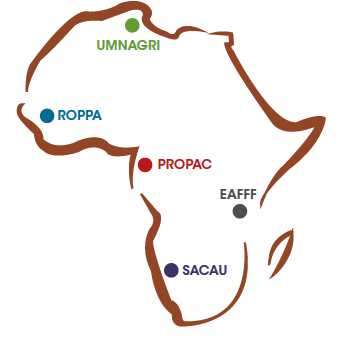Presentation
The Pan-African Farmers’ Organization (PAFO) is a continental organization with a membership base composed of Regional Farmer’s Networks.
Its Constitutive Assembly was held under the sponsorship of the African Union in Lilongwe, Malawi, from October 27 to 29, 2010. PAFO is recognized as the representative body of African farmers’ organizations at the highest continental level.
PAFO is the voice of more than 80 million African farmers integrated into nearly 73 national organizations, unions, federations, cooperatives, associations, etc., present in more than 48 countries on the continent, and united in five regional networks operating at the heart of African agriculture.

| Eastern African Farmers Federation (EAFF) |
| Regional Platform of Farmers’ Organizations of Central Africa (PROPAC) |
| Network of farmers ‘and producers’ organizations in West Africa (ROPPA) |
| Southern African Confederation of Agricultural Unions (SACAU) |
| Maghrebian and North African Union of Farmers (UMNAGRI) |
PAFO has a fundamental coordinating function both with its member networks and with continental and international organizations. It is thus able to facilitate dialogue and cooperation with the various continental and international institutions, but also with financial and technical partners.
PAFO is registered in Rwanda as an international non-governmental organization and is certified by the Rwanda Governance Board to operate legally and establish its headquarters in Rwanda under the number 001/RGB/19.
The Pan African Farmers Organization (PAFO) is recognized as the highest representative body of African farmers involved in crop, livestock, and fishery. The overarching objective of PAFO is: to effectively engage members in advocacy with policy-makers, and technical and financial partners and promote their participation in the formulation and implementation of the development policies and programs that affect agriculture and rural development in Africa.
PAFO also contributes to formulating projects and developing the capacities necessary to follow them up.
History
The creation of PAFO, as a unique continental platform in the world, is the culmination of a long process. As far as we can go back in the recent history of peasant movements, it was not until the 1980s that African countries, engaged in disengagement policies linked to structural adjustment programs, opened up to the associative life by establishing laws and regulatory frameworks that have enabled communities to organize themselves to take charge of themselves.
The emergence of these national farmer organizations has now enabled agricultural producers to take charge of their concerns. Now the peasants are involved, through national consultation frameworks, in all debates relating to strategic and political questions and give their point of view on everything related to agriculture.
And, in response to the process of globalization and to the threat which seriously weighed on the agricultural productions of the continent due to the Economic Partnership Agreements, these African peasant organizations driven by a survival instinct felt the need to come together at the sub-regional level. to better position themselves. It is therefore time to put in place genuine regional frameworks to meet the challenges of regional integration and the liberalization of international trade. Thus, in the five major economic regions of Africa, regional organizations resolutely engaged in the battle to safeguard family farming and defend the interests of millions of small producers are emerging. Grouped within the national platforms of more than 30 countries, these sub-regional networks of peasant organizations and agricultural producers from the Maghreb (UMAGRI), Southern Africa (SACAU), Central Africa (PROPAC), East Africa (EAFF), and West Africa (ROPPA), have been working together since 2003, on issues of continental interest having a significant impact on African agriculture. It is in this context that the regrouping of the five regional networks which met in Addis Ababa in May 2008, to discuss the conditions for the creation of a platform that would unite their efforts and harmonize their concerns, should be seen. These consultations led to a consensus materialized by the declaration of Addis Ababa with the foundation of the Pan-African Farmers’ Organization (PAFO). It was under the sponsorship of the African Union that the Constitutive General Assembly of PAFO was held in Lilongwe, Malawi from October 27 to 29, 2010. This meeting was placed under the high patronage of the President of the Republic of Malawi, His Excellency Ngwazi Professor Bingu Wa Mutharika and current President of the African Union.
This testifies to the attention that is now given to the African peasant movement and to family farming. This agriculture, which remains and will be for a long time, is the basis of the modern food supply in Africa. This agriculture which just needs to be supported by appropriate research, favorable investments, and adequate protection, to compete with or even exceed industrial production and which will remain the only guarantee of food sovereignty of African communities, countries, and -regions of Africa.






